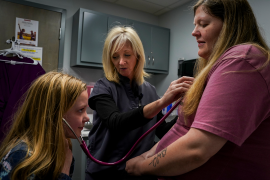High-Deductible Health Plan Enrollees More Likely to Experience Cost-Related Access Difficulties, Warning of Hazards of Health Savings Accounts for Poorer and Sicker Adults
Washington, D.C., January 27, 2005—About half of insured adults with a high-deductible health plan have medical bill problems or debts, compared with less than one-third (31%) of those with lower-deductible plans, according to new research from The Commonwealth Fund. Individuals with high-deductible plans are also more likely than those with lower-deductible plans to experience access problems such as not filling a prescription, or skipping a medical test, treatment, or follow-up when needed, due to cost. "Health savings accounts coupled with high deductible health plans have potential pitfalls, especially for families with low incomes or individuals with chronic health conditions, who are at greater risk of accruing burdensome medical debts and facing barriers to needed health care," said Commonwealth Fund President Karen Davis. "The evidence is that increased patient cost-sharing leads to underuse of appropriate care."

Davis presented the findings today at the annual meeting of the National Academy of Social Insurance (NASI) in Washington, titled "Medicare Modernization in a Polarized Environment: Facing the Challenges," as part of a panel discussion of health savings accounts. HSAs are tax-deductible savings accounts individuals can use to pay for out-of-pocket health care expenses, enacted as part of the Medicare Modernization Act (MMA) of 2003. To be qualified to establish HSAs individuals must be insured by a health insurance policy with a minimum deductible of $1,000 for individuals and $2,000 for families.
In her presentation, "High Deductible Health Plans and Health Savings Accounts: For Better or Worse?" Davis notes that nearly two of five (38%) adults with high-deductible health plans report experiencing one or more of four cost-related access problems, compared with just over one-quarter (27%) of those with lower-deductible plans. The findings are based on new analysis of data from the Fund's Biennial Health Insurance Survey.

Davis suggests some legislative fixes for HSAs that could help prevent medical access problems and burdensome medical debt:
- Reduce deductible for lower-income families.
- Exempt effective services and medications for patients with chronic conditions.
- Require provider discounts for uninsured low-income families.
- Cap income eligibility for tax-sheltered savings accounts—similar to Individual Retirement Account provisions.
- Prohibit discrimination in favor of high-wage employees in funding health savings accounts by employers.
Methodology: The Commonwealth Fund Biennial Health Insurance Survey was conducted from September 2003 through January 2004 by Princeton Survey Research Associates International. The survey consisted of telephone interviews among a nationally representative sample of 4,052 adults ages 19 and older living in the continental United States. Researchers examined where the public stands on financing broader coverage, the stability of Americans' health insurance coverage, the quality of their health benefits, and whether they can afford the health care that they need and pay their medical bills.


